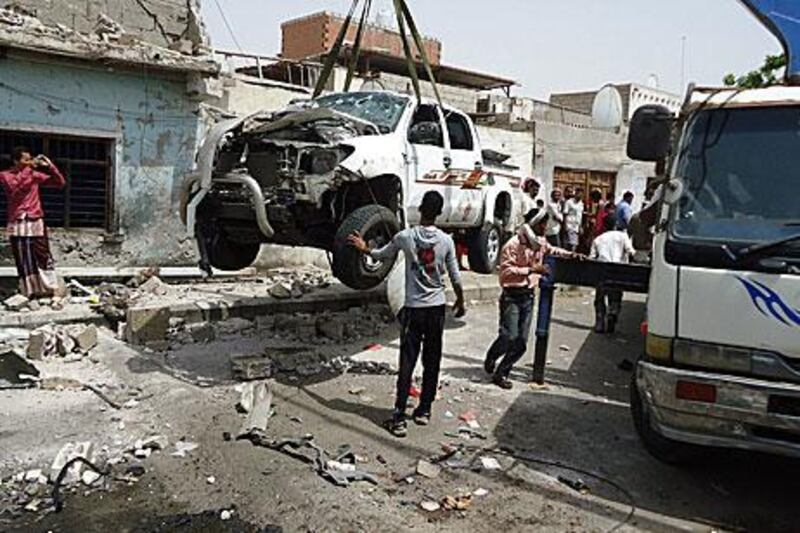ADEN, YEMEN // The commander of the military in Yemen's southern region was killed in a suicide attack in Aden today, just days after the army drove Al Qaeda-linked militants from their strongholds in the area.
The bomber, who was wearing an explosives belt, targeted Major General Salem Ali Qatan and shook his hand before detonating the explosives, witnesses said. Gen Qatan was taken to hospital, where he died. A doctor said 12 people, including 9 soldiers, were wounded.
A medic said the attacker "handed Qatan a paper, shook his hand and then detonated himself", when the general was walking to his office.
The attack shows that militants have the ability to strike despite losing ground to the army, which regained control of several towns in the southern province of Abyan last week.
Yemeni analysts said the assassination bore the hallmarks of Al Qaeda in Yemen, and was probably carried out in revenge for Gen Qatan's role in the army offensive against the militants, which was launched under his supervision.
Islamist fighters, emboldened by weak central government control, went on a rampage in Yemen's south last year while the former president Ali Abdullah Saleh was grappling with protests that eventually toppled him.
The United States, alarmed by the apparent strength of Al Qaeda-linked group Ansar Al Sharia (Partisans of Islamic Law), has supported the Yemeni army offensive against the militants.
The Yemeni army, with support from tribal militias, regained control of Abyan province last week after driving the militants out of three major strongholds - Jaar, Zinjibar and Sharqa.
The militants are believed to have retreated to safe havens in the country's mountainous regions in Shabwa, Marib and Hadramawt provinces where they enjoy tribal protection.
Many observers saw last week's victories as a boost to the standing of the interim president, Abdrabu Mansur Hadi, in the eyes of the international community. However, it is crucial to the government maintains control of the liberated areas.
"The ability to drive the militants out of these cities shows that there is a political will to crack down the militants. Hadi was able to unify the divided army to fight the militants but the challenge facing his government is how to maintain control over these cities, restore peace and normalise life by providing services and facilitating the return of displaced people," said Faris Al Saqqaf, the director of the Future Studies Centre, a think tank in Sanaa.
The recapture of the cities came after weeks of heavy bombardment and shelling of Al Qaeda positions, with the help of dozens of US troops stationed at a command centre in an airbase near the conflict zone, coordinating assaults and air strikes, and providing information to Yemeni forces, said government officials.
"The military offensive has achieved its objective but the long-term battle requires political, economic, social and cultural programmes to ensure sustainability of the fight against terror. Hadi managed to mobilise community alignment against the militants, mobilising the public opinion against Al Qaeda, turning it into a battle between them and the society and this experience can be seen elsewhere," said Mr Al Saqqaf.
Government officials say 1,600 militiamen will be dispatched in Zinjibar to help keep peace and security.
The government has said it still needs to clear landmines from the former strongholds and faces a constant threat from sleeper cells across the country.
Follow
The National
on
[ @TheNationalUAE ]
& Mohammed Al Qadhi on
[ @mohammedalqadhi ]
* With additional reporting by Reuters and Agence France-Presse





